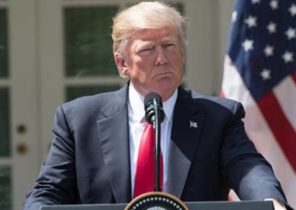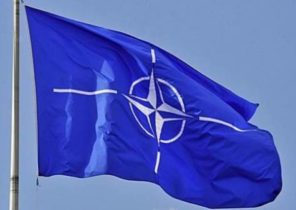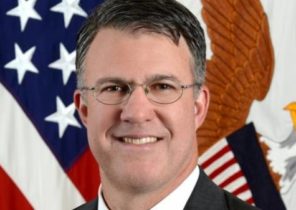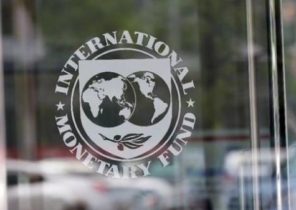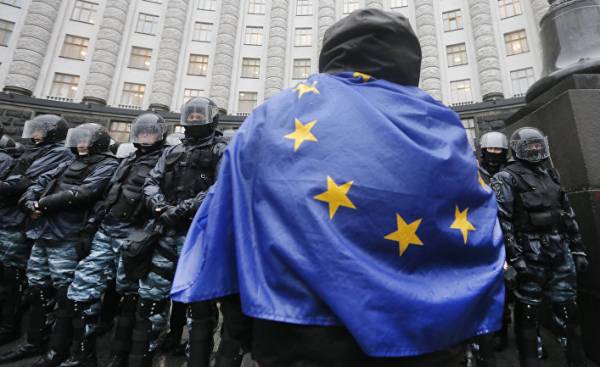
The grandson of the last Austrian Emperor Charles I and the current head of the house of Habsburg, politician and social activist Karl Von Habsburg — a supporter of the pan-European movement, which sees Ukraine as part of greater Europe. As President of the Association of national committees of the Blue shield, it works to protect cultural heritage threatened by armed conflicts. In addition, the representative of the Royal dynasty owned by a Ukrainian radio station “Country FM” (formerly “Radio EU”). In interview “” the head of the Habsburgs told how the medieval past has influenced the evolution of Ukraine and the European Union suffer the fate of the Austro-Hungarian Empire.
Apostrophe: the Family of Habsburg is known for its social activities. Please tell us a little about the house of Habsburg, the head of which you are.
Karl Von Habsburg: a Family, of course, is now very diverse, we are actively working in various fields. We are also very political family and very European. The family consists of about 600 people, so it is really huge. I can judge by my closest relatives, siblings and sisters, many of them are actively involved in the political sphere. My younger sister used to be a member of the Swedish Parliament, the other sister was the Ambassador of Georgia in Berlin, my younger brother — Hungarian Ambassador, currently working in the office of the Prime Minister on special topics. I have relatives that are active in Africa, in the Sudan, relatives, active in the United States. So this is a very versatile family. And all its members feel very European.
— And the activities of the House of Habsburg somehow coordinated or individual?
— Mostly individual activity, which, of course, to some extent, interrelated. I can’t say that they are somehow coordinating with each other, because everyone works in that area, which concerned, respectively, that which can manifest itself best. But no, no coordination.
— What are your interests in Ukraine? Your personally and the House of Habsburg?
— I am very interested in the political situation in Ukraine. I see that there is absolutely necessary to strengthen the European spirit, so I think that to be active with the pan-European Union in Ukraine is very important. But my personal interest, of course, also lies in the field of media. My work in Ukraine is connected with the radio station that works here. This is an attempt to do, on the one hand, European programme, which would at the same time was inherent to the Ukrainian spirit that is needed in a situation in which they found themselves now your country is actually at war. My main activity is the protection of cultural heritage under threat due to armed conflict. For this reason I there are many in the middle East, some Asian countries.
— What is the activity of “Fund of the Habsburgs”, which was founded in Lviv?
— The main idea was to support young students who would be deeper engaged in the issues of history, politics, geography, that is, those areas that actually form the country.
Western Ukraine is historically closely connected with the Empire your grandfather and his ancestors. Why is the awareness of this connection is important for Ukraine today?
— I think, being the last part of the Austro-Hungarian Empire, of course, you have kept this European spirit, the awareness that you are is clearly a part of something bigger than Europe, if not the structures of the EU. This European spirit is very strong, because it really is rooted in history. That’s why I think it is very important to strengthen this feeling and use it for the whole Ukraine. When the inviolability of borders of the country is under threat, or even, rather, when territorial integrity has been violated, it is important to show the unity of the country. And this is the idea I trying to promote — that Ukraine, of course, is a classic European country, which has to be considered as a single country, over which hung the threat. Ukraine deserves our special attention and support in this situation and this is why I promote the pan-European movement.
— Why do you think Ukraine is part of Europe in the mental sense?
— I think there is no doubt that the pressure has contributed to the strengthening of the one spirit in Ukraine, as it was in 2014. But I also see historically the border between Ukraine and Russia, the border, the roots of which lie in the middle Ages. On the one hand, the development of society has gone in the Western sense, Ukraine has all this heritage, which goes back to the basic principles of the Hanseatic League and similar kinds of structures. You can see that society has evolved very differently on the Eastern side of the border. So that’s the traditional border. And I don’t want to have people who would say that it is unnatural. Those who claim that the Eastern part of Ukraine is actually part of Russia, obviously, do not have eyes to see what’s really happening here.
— You fear the potential collapse of the EU?
— I am a regular optimist, when it comes to Europe. But I think you also need to be realistic and recognize that there is a threat to the existence of the European Union. Probably a couple of years ago I would have denied it, but I have to admit that at the present time in connection with certain events, there is the possibility that part of the EU will actually disintegrate that it may be a much bigger difference between, say, countries from the Eurozone and the countries outside the Eurozone that a couple of countries, except the United Kingdom, can withdraw from the EU. Although in my understanding this is not a big danger, but a small chance. And, of course, the threat to the European Union we must oppose the recovery of the European spirit.
— Can the EU face the same fate as the Austro-Hungarian Empire? How similar are the problems of Austria-Hungary and the European Union?
— You know, over the last few years we have had all these events to commemorate the centenary of the First world war and, of course, was done a lot of analysis of what made disappear the Austro-Hungarian Empire, and the threats that we face today. I must say that the threats are very similar, for example, the growing nationalism. The same thing happened before the First world war and before world war II, and again it definitely is now. That’s why I didn’t want to reject that this is actually happening. But I also see that we are in a situation when we have all the potential and all the opportunities to make Europe a success. So let’s just work on that.
— If I understand correctly, you don’t believe that globalization is the right way for Europe and the world? Why?
— I believe that globalization in most cases is a pure fiction, it does not actually exist. There are, of course, one area where globalized response would make sense is environmental issues. When it comes to global warming, environmental consequences that affect the whole world — Yes, we have to react this way. But in most cases, when we talk about a globalized response — it just doesn’t work. We have no political, economic homogeneity across the globe, there is no common system of values. It just doesn’t work. Another thing with the regions, I’m talking about large regions — continents. But as a globalized approach, I don’t know of any spheres, in addition to protecting the environment, which would really deserve such a globalized approach.
— Do not stop if a clear separation of the regions social development in Africa?
— I do not think so. Of course, we have a natural contact with many regions, where we have economic needs, we need to have cooperation with other parts of the world. You just mentioned Africa. A country that currently has the greatest impact in Africa is China, because he needs resources. But the social influence of China in Africa is zero, because it is mainly offering infrastructure in exchange for resources, and it does not require implementation of any value-oriented items in those areas in which it operates. With Europe differently. I think it is very good that different, because we have a long historical relationship because of a different colonial system that existed. And I don’t give rating to this, I’m just stating it as a fact. Of course, these relationships exist, we can clearly see them in the French speaking parts of Africa, for example. Thus, we have the responsibility, opportunities for work, and we also influence the system of values and society. And I think it is very good that we try to make it and maintain it.
You could call the main problems of the European Union?
— We have structural problems in the European Union, since not all companies work in the real European sense, I mean, of course, if you look at the EU as a state. Yes, we have a Parliament — the European Parliament, which is a very European institution. We have the Executive — the European Commission, which also operates in a very European sense. We have a court that works very well. But we have something that in a normal country, it would probably be the second chamber of Parliament. The Council of Ministers. In our case, the Council of Ministers is trying to seize all the powers that may — be it Executive or legislative. And it’s just not working because they are not European, they act in the national interest. And that is why they are not very well integrated with the whole European system, but they do not release from the hands of these powers, saying: “We pay for show.”
Of course, there are other key elements with which we have problems. I talked a lot about demagoguery during the voting. Here we have to take a different approach in order to adapt the system. There are also basic principles, one of which is the principle of subsidiarity, for example, is a very important principle that should be part of the EU because the EU or will work in accordance with this principle, either won’t work at all. And when member countries signed the Maastricht Treaty, was absolutely right when he included the principle of subsidiarity as a fundamental principle of the EU. The Maastricht Treaty — is a very complex work, written legal nonsense — I don’t know what else to call this language. But the fact that it contains the principle of subsidiarity makes it a very valuable thing in the development process of Europe.
Of course, you can mention other things that are or are not working properly or not working at all.
— Can you give some example of how broken the principle of subsidiarity?
I’ll give you the simplest example that I observed in the European Parliament, when sitting in the Committee on legal Affairs. There was supposed to discuss the norm for tractor seats, and nobody could explain to me why set such a rule for the whole of Europe, because it just doesn’t make sense. Why for someone who uses the tractor in Lapland where the snow does not melt for six months, and wears a big coat, should be the same tractor seat like someone who works in Sicily and will never wear anything thicker than the pants. Just makes no sense to decide on the European level, such problems that needs to be addressed at national or local level. I could name many more such occasions.
One time I made a proposal to the European Parliament, which, like many of my proposals have never been adopted. I said that most in the European Parliament we need a Committee that would, on the basis of the principle of subsidiarity, determine whether the draft law should be discussed in Parliament or not. If such a Committee existed, it is likely that 80% of all legislative initiatives that we have received for the representation of the European Commission or the EU Council, would have been discarded in advance, and we could focus on what actually needs to solve the European Union. I think it would be a very effective tool.
— In your opinion, the problem of migration must be addressed at the national level or the EU level?
Is definitely the subject throughout the Union, because, given the scale of immigration in Europe, no individual country is unable to cope with this problem. Germany realized this the hard way because in the beginning she was incredibly open policy, and then they suddenly saw that this flow of migrants was literally covered them, and realized that they no longer can do to cope with it. We need European standards for this, because if we will not have European standards, all the burden from migration will be on one-three countries. And these countries just can’t cope with this problem, for them, the load is too great. This is a problem that should take Europe as a whole.
— If you can convey this message to the whole of Europe? For now, the populists and the nationalists used these problems in their own political career.
— You are absolutely right, it would be extremely difficult to get this information, because, of course, we are talking about unpopular measures. But you can take some faraway European country, e.g. Portugal. Here is Portugal always said, “We are open to any quotas that we have to accept the partnership with the EU.” Well, it was quite easy for them because they know that the number of migrants will probably never arrive to Portugal, and settled on the way — in France and Germany. But they followed this policy, and I sincerely believe they meant what was said, as they noted that this is done in the framework of European cooperation. While Portugal is definitely not a rich country. For Portugal it would be a real burden. So Yes, it is a problem that is coming at us. And close your eyes before the problem of course, is no good we will not. We must, so to speak, to face this problem, and we need to openly discuss it, and Yes it will not be pleasant.
— Do you think that intolerance is a temporary problem?
— No, it’s definitely not a short-term and long-term problem because I really don’t see how this problem will dissipate. We see that this flow of refugees is creating a crisis in specific countries. It’s quite clear. For a long time it was Afghanistan, now the middle East. But it is especially aggravated by the crisis on the African continent. And I believe that exactly the same argument Africans have the right to be refugees in Europe, as well as anyone who arrived from Syria. When I look at the situation in Nigeria or some other countries, then surely you know that many millions of people will have the right to come.
Therefore, we should clearly distinguish between who is a refugee and who is an immigrant. I think we have no right to stop the refugees who come to Europe, because we have to be open to people who really need it. Otherwise, we change our core values. But we should also be stricter in question is purely economic migration. A huge percentage of people (I don’t know the percentage, and I don’t think anyone knows the actual percentage of these people) who come to our country are actually immigrants and not refugees.

